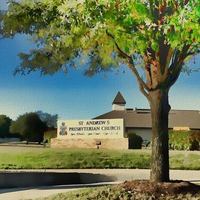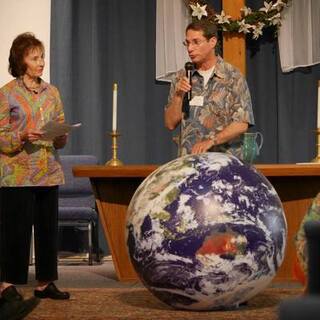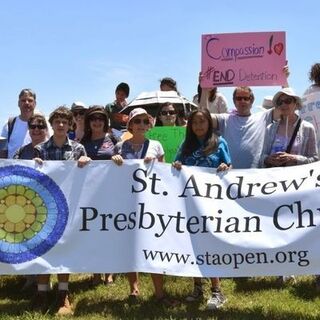Who we are
Welcome to St. Andrew's Presbyterian Church - Austin, Texas
We are Presbyterian, yet our first allegiance is to Christ’s gospel of universal love.
We are Christ centered, yet we respect and learn from all religions of love.
We affirm the ancient symbols of our faith, yet we strive to speak a new language that includes all people and affirms the scientific discoveries of our day.
We hope to teach children the stories of the Bible without sectarian dogma.
We strive to be a close, nurturing community, yet we welcome all people into our midst.
We wish to live in inner peace, yet hear God’s call to work for peace and for universal human rights.
We take faith seriously, yet believe the journey should be fun. We celebrate life in many artistic forms.
We believe in universal equality, therefore we use inclusive, egalitarian language in all our activities, and encourage its use elsewhere.
Dress & Culture: St. Andrew’s reflects the Austin community, with a ‘business casual’ atmosphere during Sunday services. We are less formal than many churches and prefer to maintain an atmosphere that’s a welcoming home to all.
Our Vision Statement
St. Andrews will be a church that celebrates and lives Christ’s universal love in the modern world.
Our Mission Statement
The mission of St Andrew’s Presbyterian Church is to learn and teach the radical and universal love of Jesus Christ by:
• Nurturing individual spirituality and growth,
• Fostering community, sharing and celebrating the circle of life
• Providing space and time for personal and communal reverence
• Championing universal human rights and courageously acting to overcome injustice
We are Presbyterian, yet our first allegiance is to Christ’s gospel of universal love.
We are Christ centered, yet we respect and learn from all religions of love.
We affirm the ancient symbols of our faith, yet we strive to speak a new language that includes all people and affirms the scientific discoveries of our day.
We hope to teach children the stories of the Bible without sectarian dogma.
We strive to be a close, nurturing community, yet we welcome all people into our midst.
We wish to live in inner peace, yet hear God’s call to work for peace and for universal human rights.
We take faith seriously, yet believe the journey should be fun. We celebrate life in many artistic forms.
We believe in universal equality, therefore we use inclusive, egalitarian language in all our activities, and encourage its use elsewhere.
St. Andrews will be a church that celebrates and lives Christ’s universal love in the modern world.
Our Mission Statement
The mission of St Andrew’s Presbyterian Church is to learn and teach the radical and universal love of Jesus Christ by:
• Nurturing individual spirituality and growth,
• Fostering community, sharing and celebrating the circle of life
• Providing space and time for personal and communal reverence
• Championing universal human rights and courageously acting to overcome injustice
Church Address

14311 Wells Port Drive
Austin,
TX
78728
United States
Phone: (512) 251-0698
Download St. Andrews Presbyterian Church vCard with Service Times
Click here to contact the church
Church Pastor

Dr. Jim Rigby
Minister
14311 Wells Port Drive
Austin,
TX
78728
United States
Phone: (512) 251-0698
Download Minister Dr. Jim Rigby vCard
Click here to contact Dr. Jim Rigby
Denomination
Presbyterian
Presbyterian churches in Austin, TX
Presbyterian churches in Texas
Presbyterian churches in United States
Presbyterian churches churches near me
All churches in Austin, TX
Affiliations
Church Website
St. Andrews Presbyterian Church on Social Media
Leadership
Leader Name:
Dr. Jim Rigby
Leader Position:
Minister
Formal Title:
Leader Address:
Phone:
Fax:
Leader Email:
Click here to contact Dr. Jim Rigby
Leader Bio:
Dr. Jim Rigby on Social Media:
Other Church Leaders:
Leadership Photos
Add a Photo
Administration
Admin Name:
Rachael Davis
Admin Position:
Church Administrator
Admin Address:
Phone:
Fax:
Admin Email:
Click here to contact Rachael Davis
Mailing Address
Driving Directions
Travel/Direction Tips
Know how to get there? Share the knowledge with others!
Parking
Please share parking information and/or parking experience!
St. Andrews Presbyterian Church Service Times
Sunday Service Times
Early Worship 8:15–9:15 a.m.
Sunday School 9:30–10:30 a.m.
Worship 10:45–11:45 a.m.
It's been more than 7 years since the last service times update. Please make sure to contact the church to confirm service times.
Please contact the church to confirm Service Times or SUBSCRIBE to updates below
Early Worship 8:15–9:15 a.m.
Sunday School 9:30–10:30 a.m.
Worship 10:45–11:45 a.m.
It's been more than 7 years since the last service times update. Please make sure to contact the church to confirm service times.
Please contact the church to confirm Service Times or SUBSCRIBE to updates below
Worship Languages
Dress Code
Sunday School / Children and Youth Activities
Under 12s:
Under 18s:
Local outreach & community activities
Other activities & ministries
Special Needs/Accessibility
Prayers and Hymns
Main Bible:
Hymns and Songs:
Other information
Average Adult Congregation:
Average Youth Congregation:
Additional Info:
St. Andrews Presbyterian Church Austin Photos
St. Andrews Presbyterian Church History
History of St. Andrew’s
St. Andrew – one of the twelve apostles, the one who introduced others to Jesus, including his brother Peter, the lad with the loaves and fish to feed the five thousand, and the Greeks. He was one who suffered martyrdom, being crucified on an X-shaped cross, which has since become the design of the national banner of Scotland, where he is the patron saint and where St. Andrew’s University was the first center of learning in that country.
The words above came from the statement of Dr. Fred Brooks, Pastor of First Presbyterian Church of Austin to support the proposal that S1 Andrew’s be the name of the new church in north Austin in the early 1950s. Just how appropriate that name was will be apparent as the congregation’s five-decade story is recounted on the following pages.
The First Forty Years
St. Andrew’s was conceived in the hearts and minds of dedicated members of the First Presbyterian Church, under the able leadership of Dr. Fred Brooks their pastor. At that that time, December 1951, First Church was downtown on Seventh and Lavaca.
The first worship service was held on March 2, 1952, in the Rosedale Elementary School on 491h west of Burnet Road. The Reverend Charles L. Dickey, newly retired as a Navy Chaplain, preached the sermon. On March 4, the Presbytery approved the formation of a new congregation. On March 29, eight were dismissed from First Church to become charter members. Within a month others came to join this nucleus and by the time the charter was closed, the membership numbered 68. On April 27,1952, St. Andrew’s was organized and constituted by the Presbytery, and the Reverend Charles L. Dickey installed as pastor. Upon the 50th Anniversary of the church, three charter members remained-Duane Skiles, Margaret Tolbert, and Ruth Ziller.
On the occasion of St. Andrew’s 40th Anniversary, the late Jane Osborne wrote a history that went beyond the facts to the inner life of the church. The follow are excerpts from her account, depicting a personified St. Andrew’s speaking from a first-person point of view.
“I have many good memories of that early childhood period in Rosedale School: Sunday School classes on the cafeteria stage, separated from the adults by only a curtain. Just as I had celebrated my second birthday, we broke ground on my first real home at 2011 Koenig Lane. The property was located on the northernmost edge of our small city in an area of new homes inhabited by young families Koenig was a quiet, unpaved, country road then. It took about a year to complete my first building. I was so proud when it was dedicated to God’s service on July l0, 1955.
In December of 1957, I felt a great sadness when my friend, Charles Dickey, left to work for the Synod of Texas. My second pastor came to guide me. His name was the Reverend Robert E. Graham, and he was with me for four very important years of life-from the age of six to ten – busy, learning years. Again I was saddened by his departure in the summer of 1962. Once again I struggled on alone for a few months; before beginning a new relationship with a young pastor who was just graduating from the seminary, the Reverend Robert E. Hendrix.
During the next four years we started a day care and kindergarten program and added a sanctuary and additional educational space to our building. We had another short time in a school building, Lamar Junior High, while the final touches were completed on the building. How proud I was when the dedication day was held in May, 1965. I felt that I had already accomplished a great deal in thirteen short years of life.
In January of 1967 Mr. Hendrix left to become educational director for the Texas Commission on Alcoholism. The Reverend Harwell E. Norris, Jr., came from Colorado to assume the responsibility of guiding a troublesome teenager toward of adulthood. There were periods when I faced insecurity and uncertainty-periods when I questioned my very existence. But Mr. Norris’ wisdom and kindness always set me back on my original path to follow the example of Simon Peter’s brother, Andrew, who learned of Jesus and was so filled with hope, love, and enthusiasm that he immediately went to find his brother and bring him to share that perfect relationship with the Messiah.
I was deeply saddened when Mr. Norris left in June, 1982 Dr. James D. Rigby came to us from San Antonio on December 1, 1982, following the six-month Interim Pastorate of Ernest Dimaline. Dr. Rigby arrived just in time to guide me through a turbulent time in my life. I found myself in the turmoil of a rapidly changing environment, which seemed to threaten my very being. That quiet, country lane on which I had decided to dwell was rapidly becoming a busy thruway surrounded by commercial enterprises. The young families I had come to serve had moved farther north to new suburbs.
By autumn of 1980, my people decided to make a great leap of faith and begin a new venture for Christ by packing up and moving northward to the Wells Branch community. It was a heart wrenching decision to make, thirty-four years of life and love had been invested in our home on Koenig Lane.
My new temporary home was a modified warehouse building with many inconveniences and discomforts, but it was better than a school building. At least we could store all our materials, even if we were stumbling over boxes sometimes. A great amount of dedication, patience, and faith was needed during the next five years as a whole new congregation was bursting out the seams of our temporary quarters. So much had to be done-finding the right property, hiring architects and builders with the vision to tum our dream into reality and securing loans to help with the building costs. At last we were ready to begin by breaking ground for our new home at 14311 Wells Port Drive. It was an exhilarating day when the first worship service was held in my beautiful new building on March 1, 1992.
This is truly a new beginning for me, but it has risen from out of all the love, hard work, and hope of hundreds of my people who through so many years gave their very best that I might have life. As I rejoice on this happy occasion, I also reach across time to clasp the hands of all the faithful who shared in our common purpose-to proclaim to a troubled world, as 8t Andrew did so long ago: “Come, we have found the Messiah!”
In addition to Jane Osborne’s account, other expressions of the spirit of the Apostle occurred in the 1980s. That creative energy resulted in the St. Andrew’s Theatre Project. Founding members Ellsworth Shave and Peggy Stoll recounted that in 1984, a trio of theater professionals and the church decided to put the same quality into religious theater as they had into secular theater, creating eleven full-blown productions over an eight-year period.
Another mission, the St. Andrew’s Preschool, begun in earlier years, continued at the Wells Port Drive location, under the 25-year leadership of Jana Lest. She was preceded as Director by Linda Corso and June Gowin. It was reluctantly discontinued in 2005.
Since 1988, the church has operated a food pantry, serving hundreds of persons. Currently, the St. Andrew’s food pantry feeds over 3,000 individuals and low-income families a year. Other outreach programs have included SafePlace for abused women, and Manos de Cristo, the Presbyterian-supported ministry in East Austin.
The longest-running group in the congregation is the Tuesday Morning Bible Study. Begun during the pastorate of Harwell Norris, the group has met even on July 4, when it fell on a Tuesday, but not on Christmas. Jo Cochran and Ann Moxley have attended since its start.
More Recent Times
St Andrew’s Presbyterian Church has sought to be true to its apostolic namesake in new ways. As the Apostle Andrew introduced people to Jesus, including the Greeks who were considered outsiders, so has this congregation sought to be inclusive. The former Music Director, David Gambrell, expressed this conviction in a hymn he wrote for the Jubilee:
People of love, people of grace, look for your God in a stranger’s face.
Care for all the human race, People of love and grace.
He also set to music the church’s motto “Open Minds, Open Hearts and Open Hands.”
Others who have shared this ministry over the decade with Jim Rigby, who came nearly twenty years ago, have been these pastors: Joel L. Aldridge Parish Associate 1986-1992 retired; Shane Whisler (Associate Pastor) 1995-2001 to Synod of the Sun; Marsha Brown (Associate Pastor) 2000—? To —? Ann Rosewall, Interim for Pastoral Care and Church Growth, and Richard Thompson, Volunteer for Communication and Program served from 2002—? The longest staff person was Diane Toussaint, who served as church secretary for over thirty years.
The current church brochure describes the church’s progressive spirit in this way:
We are a different kind of congregation, who takes the Bible seriously not literally, Whose family values include married, divorced, single, gay, and straight people, who loves children and affirms women’s rights. St. Andrew’s is part of More Light Presbyterians, a group that welcomes and affirms diversity.
The emphasis on social justice was controversial. But at a congregational meeting in October 1994, the majority voted to continue in the direction that had been set. There was a loss of membership then, as there was eight years later when the policy of using inclusive language in worship was adopted. In this way St. Andrew’s Presbyterian Church has been willing to take risks for the sake of the gospel, as St. Andrew himself did.
Yet its commitment to justice and the compassion of Christ in society has made this church a “beacon on a hill” in the wider Austin area, as well as a distinctive landmark on Wells Branch Parkway. An example has been The Field of Hope, whereby on Palm Sunday hundreds of white crosses were placed on the hill down from the sanctuary to commemorate those who have died from from AIDS. Pastor Rigby explained on a March 31, 1996, KVUE Channel 24 televised news broadcast how this annual observance was open to everyone in the community who had lost loved ones to that illness. Since the inception of the National AIDS Awareness Day, the Field of Hope was celebrated in October for many years.
Thus, St. Andrew’s story continues into the 21st century in the hearts and lives of it members.
St. Andrew – one of the twelve apostles, the one who introduced others to Jesus, including his brother Peter, the lad with the loaves and fish to feed the five thousand, and the Greeks. He was one who suffered martyrdom, being crucified on an X-shaped cross, which has since become the design of the national banner of Scotland, where he is the patron saint and where St. Andrew’s University was the first center of learning in that country.
The First Forty Years
St. Andrew’s was conceived in the hearts and minds of dedicated members of the First Presbyterian Church, under the able leadership of Dr. Fred Brooks their pastor. At that that time, December 1951, First Church was downtown on Seventh and Lavaca.
The first worship service was held on March 2, 1952, in the Rosedale Elementary School on 491h west of Burnet Road. The Reverend Charles L. Dickey, newly retired as a Navy Chaplain, preached the sermon. On March 4, the Presbytery approved the formation of a new congregation. On March 29, eight were dismissed from First Church to become charter members. Within a month others came to join this nucleus and by the time the charter was closed, the membership numbered 68. On April 27,1952, St. Andrew’s was organized and constituted by the Presbytery, and the Reverend Charles L. Dickey installed as pastor. Upon the 50th Anniversary of the church, three charter members remained-Duane Skiles, Margaret Tolbert, and Ruth Ziller.
“I have many good memories of that early childhood period in Rosedale School: Sunday School classes on the cafeteria stage, separated from the adults by only a curtain. Just as I had celebrated my second birthday, we broke ground on my first real home at 2011 Koenig Lane. The property was located on the northernmost edge of our small city in an area of new homes inhabited by young families Koenig was a quiet, unpaved, country road then. It took about a year to complete my first building. I was so proud when it was dedicated to God’s service on July l0, 1955.
In December of 1957, I felt a great sadness when my friend, Charles Dickey, left to work for the Synod of Texas. My second pastor came to guide me. His name was the Reverend Robert E. Graham, and he was with me for four very important years of life-from the age of six to ten – busy, learning years. Again I was saddened by his departure in the summer of 1962. Once again I struggled on alone for a few months; before beginning a new relationship with a young pastor who was just graduating from the seminary, the Reverend Robert E. Hendrix.
In January of 1967 Mr. Hendrix left to become educational director for the Texas Commission on Alcoholism. The Reverend Harwell E. Norris, Jr., came from Colorado to assume the responsibility of guiding a troublesome teenager toward of adulthood. There were periods when I faced insecurity and uncertainty-periods when I questioned my very existence. But Mr. Norris’ wisdom and kindness always set me back on my original path to follow the example of Simon Peter’s brother, Andrew, who learned of Jesus and was so filled with hope, love, and enthusiasm that he immediately went to find his brother and bring him to share that perfect relationship with the Messiah.
By autumn of 1980, my people decided to make a great leap of faith and begin a new venture for Christ by packing up and moving northward to the Wells Branch community. It was a heart wrenching decision to make, thirty-four years of life and love had been invested in our home on Koenig Lane.
My new temporary home was a modified warehouse building with many inconveniences and discomforts, but it was better than a school building. At least we could store all our materials, even if we were stumbling over boxes sometimes. A great amount of dedication, patience, and faith was needed during the next five years as a whole new congregation was bursting out the seams of our temporary quarters. So much had to be done-finding the right property, hiring architects and builders with the vision to tum our dream into reality and securing loans to help with the building costs. At last we were ready to begin by breaking ground for our new home at 14311 Wells Port Drive. It was an exhilarating day when the first worship service was held in my beautiful new building on March 1, 1992.
In addition to Jane Osborne’s account, other expressions of the spirit of the Apostle occurred in the 1980s. That creative energy resulted in the St. Andrew’s Theatre Project. Founding members Ellsworth Shave and Peggy Stoll recounted that in 1984, a trio of theater professionals and the church decided to put the same quality into religious theater as they had into secular theater, creating eleven full-blown productions over an eight-year period.
Another mission, the St. Andrew’s Preschool, begun in earlier years, continued at the Wells Port Drive location, under the 25-year leadership of Jana Lest. She was preceded as Director by Linda Corso and June Gowin. It was reluctantly discontinued in 2005.
The longest-running group in the congregation is the Tuesday Morning Bible Study. Begun during the pastorate of Harwell Norris, the group has met even on July 4, when it fell on a Tuesday, but not on Christmas. Jo Cochran and Ann Moxley have attended since its start.
More Recent Times
St Andrew’s Presbyterian Church has sought to be true to its apostolic namesake in new ways. As the Apostle Andrew introduced people to Jesus, including the Greeks who were considered outsiders, so has this congregation sought to be inclusive. The former Music Director, David Gambrell, expressed this conviction in a hymn he wrote for the Jubilee:
People of love, people of grace, look for your God in a stranger’s face.
Care for all the human race, People of love and grace.
Others who have shared this ministry over the decade with Jim Rigby, who came nearly twenty years ago, have been these pastors: Joel L. Aldridge Parish Associate 1986-1992 retired; Shane Whisler (Associate Pastor) 1995-2001 to Synod of the Sun; Marsha Brown (Associate Pastor) 2000—? To —? Ann Rosewall, Interim for Pastoral Care and Church Growth, and Richard Thompson, Volunteer for Communication and Program served from 2002—? The longest staff person was Diane Toussaint, who served as church secretary for over thirty years.
The current church brochure describes the church’s progressive spirit in this way:
We are a different kind of congregation, who takes the Bible seriously not literally, Whose family values include married, divorced, single, gay, and straight people, who loves children and affirms women’s rights. St. Andrew’s is part of More Light Presbyterians, a group that welcomes and affirms diversity.
The emphasis on social justice was controversial. But at a congregational meeting in October 1994, the majority voted to continue in the direction that had been set. There was a loss of membership then, as there was eight years later when the policy of using inclusive language in worship was adopted. In this way St. Andrew’s Presbyterian Church has been willing to take risks for the sake of the gospel, as St. Andrew himself did.
Thus, St. Andrew’s story continues into the 21st century in the hearts and lives of it members.
St. Andrews Presbyterian Church Historical Photos
Add a historical photo
 Thank You, Lord
Thank You, Lord
Your Holy Spirit enfolds me - making me realize I am not alone. Thank You for Your strength, Your wisdom and the comfort of Your presence. Even in the most agonizing times I have the knowledge that You are there, Lord. When all I can do is whisper Your Name, it is enough. You hear. You care. You understand. My praise and adoration, Lord Jesus. Amen.
St. Andrews Presbyterian Church listing was last updated on the 7th of September, 2017
THANK YOU FOR VISITING ST. ANDREWS PRESBYTERIAN CHURCH ONLINE!
St. Andrews Presbyterian Church Accelerated Mobile Page (AMP)









